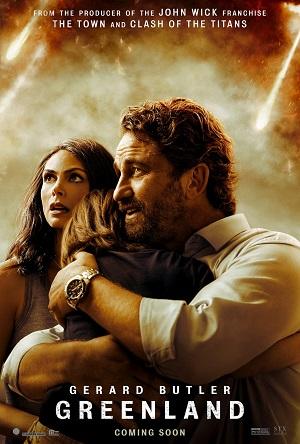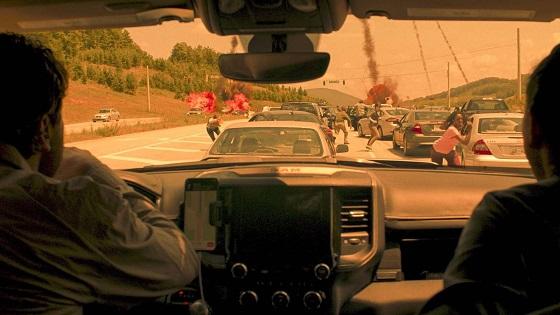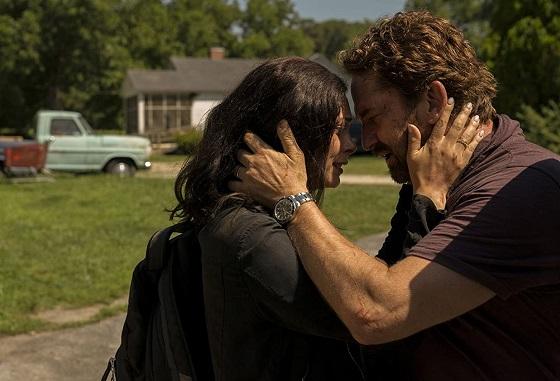

[Rating: Solid Rock Fist Up]
Greenland opens Friday, December 18 on VOD.
Damn it all: Greenland should not be this good. Disaster movies are traditionally all about the spectacle, the “oh shit” moments when the tidal wave crushes Manhattan, the spaceship blows up the White House, or a volcano engulfs Yellowstone: they rarely leave room for real heart. Directed by a stuntman (Ric Roman Waugh) and starring the most balls-out, unapologetic action star of the last decade (Gerard Butler), Greenland is a stunningly emotional, prescient suspense drama that is less concerned about the comet headed to Earth, and more about the humanity of those bracing for its impact.
The script by Chris Sparling is efficient and makes quick work of the character introductions and established family dynamic of structural engineer John Garrity (Butler), and his wife Allison (Morena Baccarin). The couple live in the Atlanta suburbs with their young diabetic son, Nathan (Roger Dale Floyd), and are hosting a neighborhood party at their house to watch the impact of rogue comet ‘Clarke.’ According to news reports, the first bits of the comet are supposed to splash down harmlessly into the ocean, yet just prior to the initial impact John sees air armadas flying north and receives an Emergency Broadcast System message telling him to evacuate his family to a designated location. None of John’s neighbors get this message, and it serves as the first hint that something more serious than what is being reported on the news is coming down the pipe.
These suspicions turn out to be correct, and once the first comet fragments hit and start annihilating whole cities, all the worst parts of the Bible minus the horsemen become reality. Racing to their evacuation point so a military plane can fly them to bunkers in Greenland, John, Allie, and Nathan must contend with crowds, traffic, insulin shortages, and the worst instincts of panicked humanity. It’s this last point that serves as the cradle for the film’s most effective drama, for again, the comet in Greenland is the engine for conflict, but not the instrument for it.

With only 48 hours until the largest, planet-killing comet fragment hits, things get desperate for those like John, who have been designated as essential evacuees, but even more for those that aren’t as lucky. It’s hard to view any film in late-2020 through a lens that doesn’t include COVID-19, yet when featuring a catastrophic global event, questions about the ways people treat each other in desperate situations hits a little harder. The scenes in disaster films where some mustache twirling character turns on the “good guys” in a treacherous moment of self-preservation is nothing new, yet it takes on new shades of familiar desperation in Greenland. At a time in human history where a simple life-saving action like wearing a mask is controversial, scenes portraying the base ugliness of mankind on the brink of annihilation do not feel very out of reach.
What’s more, the film is hesitant to judge the characters it puts in these situations, for whether it’s John and Allie tearfully refusing to take a neighbor’s child with them, or another family turning on an innocent woman to ensure their own survival, Greenland honestly engages with its characters and their world. Structurally, the narrative’s focus wisely remains tight and doesn’t allow itself to drift far from John, Allie, and Nathan. The movie never jumps up to give a bird’s eye view of the conflict, nor does it shift into B- or C-plots about the president and their science advisors arguing over which nuke to shoot at the comet. A tense interaction between John and Allie early on, before the first comet fragments hit, tells the audience everything they need to know about this couple, and it sustains the characters throughout. “How long is this going to be awkward for?” John asks his wife, hinting at unresolved trouble that some tidy 3rd act work (and an awesome pinch-hit appearance by Scott Glenn) molds into a fully formed relationship arc for this family.

Which isn’t to say that disaster genre enthusiasts will be disappointed by this one, as there are plenty of stunning shots of comet fragments streaking towards the horizon, jet fuel explosions, and wild CGI renders of panicked crowds running as if from a zombie horde. This is a Gerry Butler joint, after all, and at times it feels like a prequel to Mad Max: Fury Road. Perhaps most importantly, Greenland allows Butler to speak in his glorious, natural Scottish brogue, which is like replacing a hunter’s bow with a laser-scoped sniper rifle. It takes Greenland about 90 minutes to work its way towards a story involving a kilt to acknowledge that John speaks differently than everyone else (utterly refusing to explain the accent), and it’s a note other films should take when casting the guy (I’m looking at you, Den of Thieves).
Mr. Butler is just one component (albeit a crucial one) to the success of the picture, one that is elevated above its genre’s pedigree by its commitment to the exploration of the human condition under the worst circumstances. The film cares about its characters and is interested in their drama rather than the larger events that a lesser movie would focus on (likely using John, Allie and Nathan as little more than pawns in service to that). Again, movies like this have no right being as riveting and emotionally legitimate as Greenland is, but then again, if one is already viewing this through a COVID lens, then they should readily submit to this year’s biggest lesson: anything is possible.





Comments on this entry are closed.